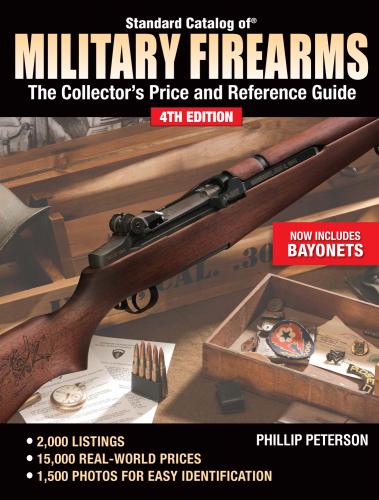Canadian No. 4 Mk1 T “Long Branch” Sniper with original matching Canadian “R.E.L.” scope set (No. 32 Mk3). All numbers match on this rifle. Notice the broad arrow on the left side of the scope • Courtesy Michael Wamsher, Paul Goodwin photo
Bayonet for Ross Rifles
Courtesy Buffalo Bill Historical Center, Cody, Wyoming
Mark III*
As above, with a magazine cutoff.
Bayonet for Ross Rifles
Wood handle. Muzzle ring. 10" single edge blade. The blade tip was recut after 1915 to make a sharper point. Leather scabbard. Some will be seen with U.S. markings, but they usually do not alter the value. Price range 150 – 75.
Ross Military Match Rifle
A .280 Ross or .303 caliber straight pull military-style rifle with a 30" barrel having peep sights. Blued with a walnut stock. Similar in appearance to the Mark III except for flush magazine with .280 version.
Ross Military Training Rifle
Chambered for the .22 caliber cartridge, this straight pull rifle is single shot only.
LEE ENFIELD
Long Branch
Rifle No. 4 Mark I & Mark I*
Same as the English No.4 Mk 1 in .303 British. 10 round detachable magazine. Some have walnut stocks. Serial numbers should appear on the receiver, bolt and fore stock. Slight premium over the English-made rifles.
Rifle No. 4 Mark I (T) & Mark I* (T)
These are sniper versions of the No. 4 Mark I and the Mark I*. Fitted with scope mounts on the left side of the receiver and a wooden cheekpiece screwed to the buttstock. A No. 32 or a No. 67 (Canadian) telescope was issued with these rifles. A few, estimated to be about 100, were fitted with U.S. Lyman scopes. Many of these rifles were converted by Holland & Holland. About 25,000 rifles using various telescopes were converted.
Winchester Model 1894 Carbine • Courtesy Rock Island Auction Company
NOTE: Prices above are for rifles in original wood case and scope numbered to the rifle. Deduct 10 percent if scope mount does not match the rifle. For rifles without case deduct 10 percent. For a rifle without the scope and rings but with cheek piece and scope bases deduct 75 percent.
Model 1894 Carbine
This is the Canadian military version of the Winchester saddle ring carbine. Fitted with a 20" barrel and chambered for the .30-30 cartridge. Extra set of sling swivels added to left side of buttstock and forearm. Stamped with the Canadian “Broad Arrow” (an arrow inside the letter C).
FABRIQUE NATIONALE
C1/C1A1 (FN FAL)
Canada was one of the first countries to adopt the FN-FAL rifle. This is a semi-automatic version with 21" barrel. Twenty-round box magazine. The rear sight on the C1 is a revolving disk with five different sized openings. Ranges calibrated from 200 to 600 yards; numbered 2 to 6 on the sight. The sight may be folded when not in use. Weight is about 9.5 lbs. About 1959 the C1 was modified to use a 2-piece firing pin and a plastic carry handle replaced the wooden type. Both types of rifles utilize the long prong flash hider on the muzzle. The author could find no indication that any of these were ever legally imported to the U.S. as a semi automatic. It would have to be in the same class as the FN FAL “G” series as the receiver is capable of accepting select fire parts.
For C1/C1A1 registered as NFA firearms:
Pre-1986
| Exc. | V.G. | Fair |
| 18500 | 15000 | 10000 |
C2/C2A1
This is Canada’s version of the FN heavy barrel Squad Light Automatic Rifle. Select fire with a rate of fire of about 700 rounds per minute. Barrel length is 21". Magazine capacity is 30 rounds. Weight is approximately 15 lbs. Built by Long Branch Arsenal, Ontario.
Pre-1986
| Exc. | V.G. | Fair |
| 18500 | 15000 | 12500 |
C7/C8 (M16A2)
In 1985 the Canadian firm of Diemaco began producing a Canadian version of the Colt M16A2 rifle. There are differences between the Colt-built M16 and the Diemaco version. However, due to import restrictions on Class 3 weapons, no Diemaco M16s were imported into the U.S. for transferable civilian sale. Therefore, no Diemaco lowers are available to the civilian collector. There are Diemaco uppers in the U.S. that will fit on Colt lowers. The 20" rifle version is designated the C7 while the 16" carbine version is called the C8. There are a number of other Diemaco Canadian uppers that may be seen in the U.S., such as the LMG and 24" barreled versions. Values should be comparable with those of Colt uppers.
MACHINE GUNS
NOTE: Canada used the Lewis and Vickers machine guns during World War II. The Toronto firm of John Inglis produced Mark I and Mark II Bren guns in .303 caliber in large quantities for British and Canadian troops. Beginning in 1943 Canada produced almost 60 percent of the total Bren gun production for World War II. This amounted to about 186,000 guns produced during the war. Canada also uses the Browning Model 1919A4, called the C1 machine gun in 7.62mm (.308) as its primary light machine gun.
See Great Britain Machine Guns, Bren.
C1A1 • Courtesy West Point Museum, Paul Goodwin photo
